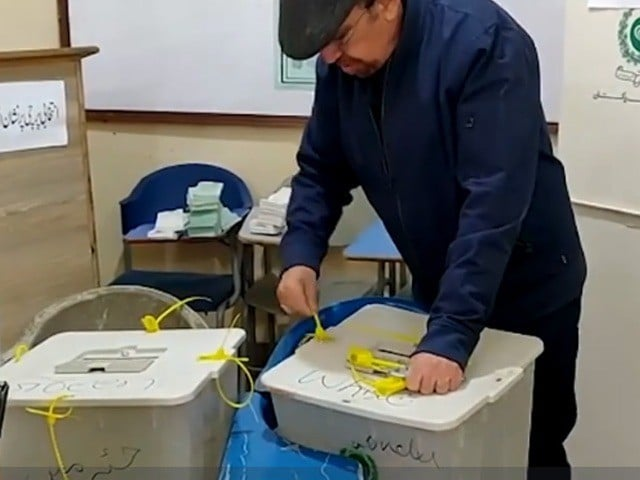Some political nobodies who stare in eyes of electables
Many fresh faces stand up to challenge status quo in Sindh’s politics

In Sindh, a wave of change is challenging entrenched political dynasties and elite dominance as a cadre of new candidates emerge to contest the upcoming general elections. These fresh faces, largely from the middle and lower-middle classes, are boldly confronting the established "electables" who have wielded power and privilege in parliamentary politics for decades. Across various districts of Sindh, these candidates are fervently campaigning, positioning themselves as viable alternatives to the entrenched family-centric politics.
Among them is Sindhoo Nawaz Ghanghro, an activist advocating for the restoration of student unions, who is contesting independently for the PS-32 seat in Nausheroferoze district. Ghanghro, a graduate of the National College of Arts (NCA), Lahore, represents a new breed of candidates challenging the status quo. Her opponent, Syed Sarfaraz Hussain Shah of the Pakistan Peoples Party (PPP), a seasoned politician, faces an unexpected challenge from Ghanghro's grassroots movement.
Ghanghro's candidacy symbolizes a growing movement against feudal influence in Sindh, with ordinary citizens stepping forward courageously to contest established power structures. The outcome of her race could mark a significant shift in Sindh's political landscape, signalling a departure from traditional family politics towards a more inclusive and representative governance model.
In a constituency long considered a stronghold of the Pakistan Peoples Party (PPP), where 171 polling stations serve 227,215 registered voters, the upcoming elections witness a formidable challenge from independent candidate Sindhoo Nawaz Ghanghro. Facing competition from Syed Zohaib Ali Shah of the Grand Democratic Alliance (GDA) and Bashir Ahmed Channa of the Pakistan Tehreek-e-Insaf (PTI), Ghanghro represents a departure from the entrenched political elite.
For her supporters, Ghanghro embodies a beacon of hope, advocating fiercely for the rights of women, marginalized communities, peasants, and laborers. Her vocal opposition to the ruling elite, feudal structures, and district administration resonates deeply with constituents disillusioned by the lack of alternatives to traditional power brokers.
Expressing the sentiments of many voters, Ghanghro asserts, "We now offer them a choice," highlighting her commitment to breaking the status quo. Identifying governance failures, merit violations, inadequate infrastructure, healthcare, education, and rampant lawlessness as key concerns, Ghanghro's entry into politics signals a determined effort to effect societal change.
Read: Electables versus selectables
Her election symbol, the wall clock, symbolizes a call for timely reforms and accountability. With Ghanghro's candidacy, voters anticipate a transformative shift away from entrenched interests towards a more inclusive and responsive political landscape.
Ustad Liaquat Mirani, a former principal of Army Public School in Dadu, emerges as a formidable contender in PS-13 Dokri Taluka, Larkana district, challenging the stronghold of the Pakistan Peoples Party (PPP), particularly poignant as it is the home district of the PPP chairman. With 190 polling stations serving 224,914 registered voters in the constituency, Mirani's candidacy represents a break from traditional campaign tactics. Rather than relying on lavish motorcades, Mirani, who proudly identifies as the son of a fisherman, conducts his campaign primarily from a humble donkey or horse cart.
Mirani's platform is rooted in advocacy for education and social justice, encapsulated in his simple yet powerful slogan, "Please vote for education," and symbolized by the dove, representing peace and progress. Despite facing threats from entrenched feudal powers warning him against contesting the election, Mirani remains undeterred in his commitment to represent the interests of ordinary citizens.
Meanwhile, Comrade Seengar Noonari, hailing from a lower-middle-class family in Nasirabad Taluka, Kamber-Shahdadkot district, emerges as a beacon of change in PS-17. Noonari's candidacy, backed by the Awami Workers Party and rooted in a left-leaning ideology, challenges the four-decade reign of the influential feudal family represented by Nawab Burhan Khan Chandio of the PPP. Inspired by the results of previous local government elections, where his group's candidates triumphed over nominees of the ruling elite, Noonari is emboldened to confront the status quo and advocate for the rights of the people.
In urban Sindh, Syed Khalil Ahmed Shah, chairman of Awami Raaj Tehreek, stands as a symbol of defiance against entrenched power structures in PS 98 East Karachi. His activism, including his involvement in advocating for justice in the case of the murder of Nazim Jokhio, demonstrates a commitment to challenging the influence of powerful tribal chiefs and political heavyweights. Shah's candidacy against several formidable opponents, including PPP's Hakim Ali Jiskani, PML-N's Kareem Gabool, and MQM's Assalan Parvez, underscores his determination to represent the aspirations of ordinary citizens and bring about meaningful change in the political landscape of urban Sindh.
These grassroots challengers, driven by a fervent belief in the power of democracy and social justice, embody the hopes of a disenfranchised populace yearning for a brighter and more equitable future. As they defy threats and intimidation, they stand as beacons of hope for a new era of inclusive and accountable governance in Sindh.



















COMMENTS
Comments are moderated and generally will be posted if they are on-topic and not abusive.
For more information, please see our Comments FAQ